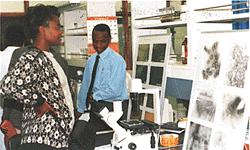Achievements of GII
(1)Results of the First Year of the GII
The GII has been steadily progressing. Aggregation of all GII projects in the first year (April 1994/March 1995) exceeded 49.3 billion yen (US$465 million). Out of this about 7.9 billion yen (US$75 million) was allocated for the population direct cooperation such as population/family planning, mother and child health care, etc. and 40 billion yen (US$380 million) was extended for the population indirect cooperation such as primary health care, primary education, women's literacy education and vocational training, etc, total of150 million yen (US$1.4 million) was allocated for HIV/AIDS.GII
(2)Cooperation in the Population Sector
Recognizing the importance of the population problem, Japan has been tackling this issue, promoting direct and indirect cooperation since a long time. After the announcement of the GII in February 1994, population issue has been further focussed. In the field of bilateral cooperation, technical cooperation combining three types of ODA schemes, training, dispatch of experts and provision of equipment, has been implemented in 8 countries such as the Philippines, Thailand, Mexico, Kenya, etc. In addition, ODA loans were also provided for strengthening health centers in Indonesia and to Grameen Bank in Bangladesh to support economic independence of women. As for grant aid, hundreds of projects such as projects for primary health care, construction of primary schools and the project for women's empowerment, were implemented in various places of the world. Furthermore, Japan contributes positively to solve population problems of developing countries by implementing various types of projects such as acceptance of trainees and support of NGOs.
(3)HIV/AIDS Cooperation
Cooperation in HIV/AIDS area is pursued mainly by technical cooperation and Grant Assistance for Grass Roots Projects to NGOs. In Thailand and Ghana, for example, project type technical cooperation has been implemented and in Indonesia, the Philippines, Uganda, etc. equipment for HIV/AIDS prevention and surveillance was provided. Grant Assistance for Grass Roots Projects was provided to NGOs in 16 developing countries, which implemented HIV/AIDS related projects in 1994.

Participants of a Workshop on HIV/AIDS held within the framework of Technical Cooperation of Japan (Ghana)
(4)Cooperation in the Field of Children's Health
In developing countries, many children die of infectious diseases which can be easily prevented with vaccines. To save children, Japan has been promoting vaccine cooperation to support WHO's eradication programme of Poliomyelitis by the year 2000 and "Child Vaccine Initiative" for the improvement of production and supply of vaccines in developing countries. Children's health has been regarded as one of the Japan-U.S. Common Agenda since 1994, and promoted as one area of primary health care of population indirect cooperation of the GII. Japan has been positively contributing, in particular, to polio eradication in Asian countries.
![]() &
&![]() Japan' s Cooperation to Expanded Programme on Immunization (EPI) and Polio Eradication Programme
Japan' s Cooperation to Expanded Programme on Immunization (EPI) and Polio Eradication Programme
Back to Index
